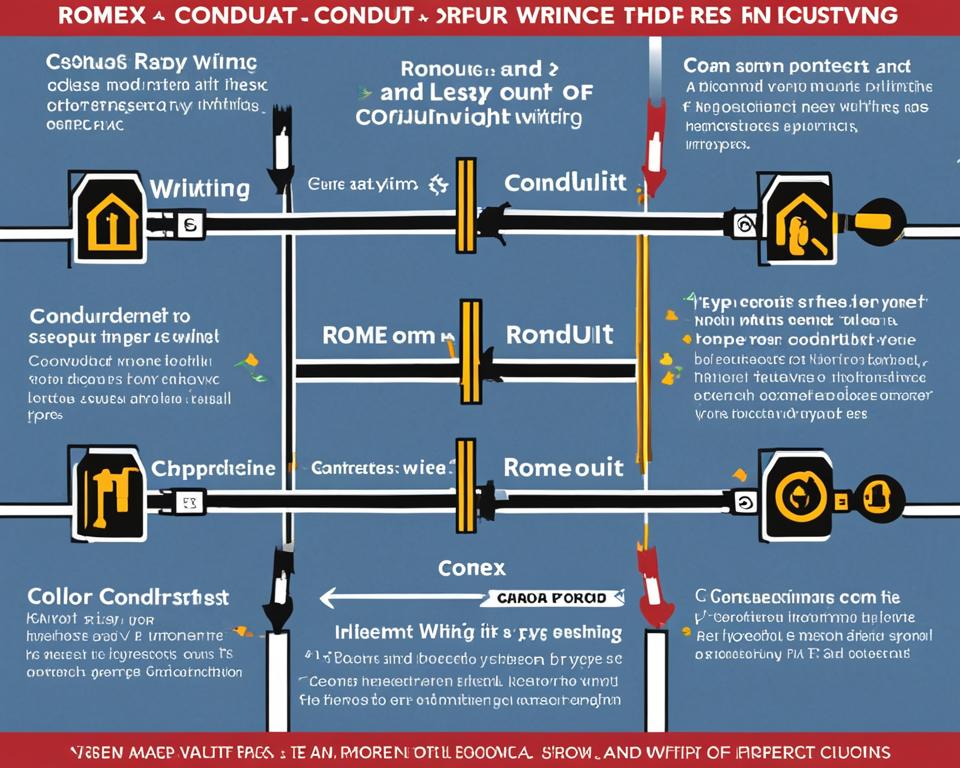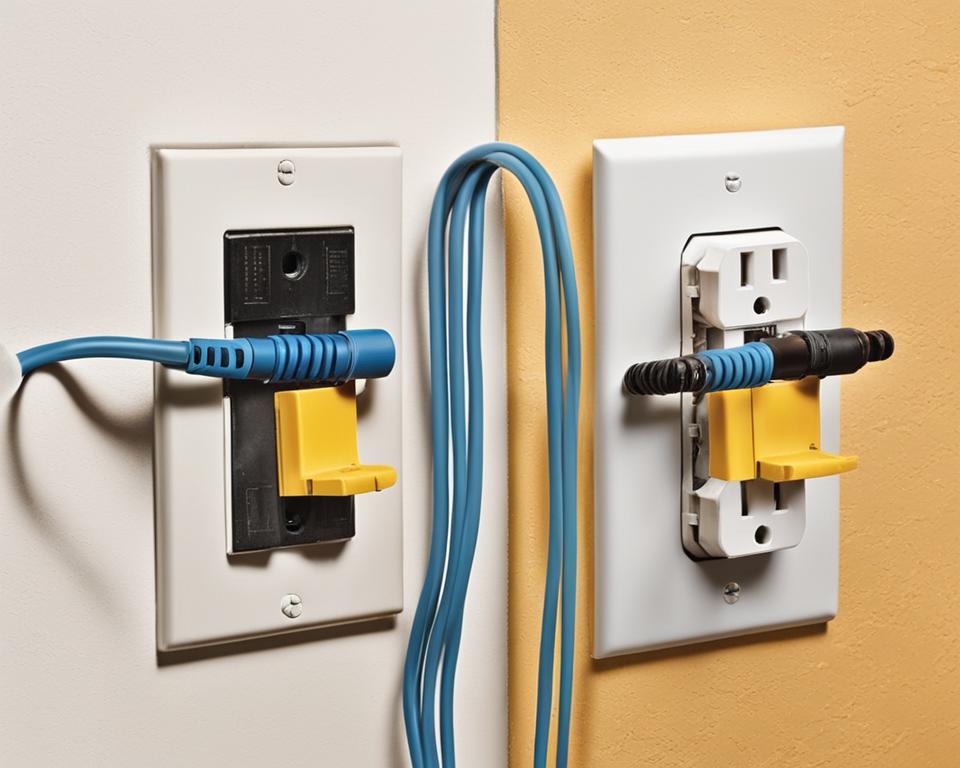When it comes to electrical wiring in residential installations, two common options are Romex and conduit. Understanding the pros and cons of each can help you make an informed decision for your electrical installation. In this article, we will explore the differences between Romex and conduit wiring, considering factors such as electrical safety, wiring insulation, wire management, and compliance with electrical codes.
Key Takeaways:
- Romex is a flexible and cost-effective wiring option, ideal for most residential installations.
- Conduit wiring provides superior wire protection and management, making it suitable for demanding environments.
- Both Romex and conduit wiring must comply with electrical codes and regulations to ensure safety and adherence to standards.
- Consider the specific requirements of your electrical installation when choosing between Romex and conduit wiring.
- Consult with a professional electrician to determine the best wiring option for your specific needs.
Understanding Romex Wiring
Romex wiring, also known as Non-Metallic (NM) sheathed cable, is a composite cable consisting of one or more “hot” conductors, a neutral conductor, and a ground wire. It is widely used in residential applications due to its flexibility, ease of installation, and cost-effectiveness.
Romex wiring is known for its excellent electrical insulation, as each individual conductor is insulated, and the entire bundle is sheathed in PVC plastic. This provides protection against insulation failure and reduces the risk of accidental electrocution and arcing.
Romex wiring is also resistant to moisture and durable. It is important to note that Romex wiring should not be used in outdoor or wet locations, as it is not approved for these conditions. It is crucial to adhere to electrical codes and regulations when installing Romex wiring to ensure electrical safety and compliance.

| Pros | Cons |
|---|---|
| Flexible and easy to install | Not approved for outdoor or wet locations |
| Cost-effective | Stripping the jacket off may not comply with electrical codes |
| Excellent electrical insulation | |
| Resistant to moisture | |
| Facilitates efficient wire management |
Exploring Conduit Wiring
In electrical installations, conduit wiring is a popular method that involves the use of metal or PVC conduits to protect and route electrical wires. While commonly used in commercial and industrial applications, conduit wiring can also be beneficial for residential installations that require enhanced wire protection and management.
Conduit wiring offers superior wire protection compared to other wiring methods. By enclosing the electrical wires within conduits, it provides an extra layer of defense against physical damage. This is particularly useful in environments where wires may be exposed to potential hazards or where wiring runs must be exposed.
One of the key benefits of conduit wiring is improved wire management. The conduits allow for better organization and containment of the electrical wires, making it easier to trace, identify, and maintain the wiring system. This can be especially advantageous in large or complex electrical installations.
Additionally, conduit wiring ensures compliance with electrical codes and regulations. The use of conduits provides an added level of safety and containment for the electrical wires, addressing the requirements set forth by electrical codes. This helps prevent accidental damage and reduces the risk of electrical hazards.
Despite its advantages, it’s important to note that conduit wiring may be more expensive and time-consuming to install compared to other methods, such as Romex wiring. The installation process typically involves the proper positioning and securing of conduits, adding to the overall complexity of the project. However, the enhanced durability and versatility of conduit wiring make it a suitable option for a variety of applications, including outdoor and wet locations.
Consulting with a professional electrician is recommended when considering conduit wiring for your electrical installation. They can assess your specific needs and provide guidance on the most suitable wiring method to ensure compliance with electrical codes, efficient wire management, and optimal wire protection.

Key Points:
- Conduit wiring uses metal or PVC conduits to protect and route electrical wires.
- It offers superior wire protection and better wire management compared to other wiring methods.
- Conduit wiring ensures compliance with electrical codes and regulations by providing additional containment for the electrical wires.
- It may be more expensive and time-consuming to install, but it offers enhanced durability and can be used in various applications.
- Consulting with a professional electrician is recommended to determine the best wiring method for your specific needs.
- Conduit wiring uses metal or PVC conduits to protect and route electrical wires.
- It offers superior wire protection and better wire management compared to other wiring methods.
- Conduit wiring ensures compliance with electrical codes and regulations by providing additional containment for the electrical wires.
- It may be more expensive and time-consuming to install, but it offers enhanced durability and can be used in various applications.
- Consulting with a professional electrician is recommended to determine the best wiring method for your specific needs.
Pros and Cons of Romex Wiring
Romex wiring is a popular choice for residential installations due to its numerous advantages. Let’s take a closer look at the pros and cons of using Romex wiring for your electrical needs:
Advantages of Romex Wiring:
- Flexibility: Romex wiring is highly flexible, allowing for easy installation in various spaces. It can be maneuvered around corners and obstacles, making it a versatile option for different electrical layouts.
- Cost-Effective: Romex wiring is readily available and cost-effective, making it a budget-friendly choice for homeowners. It offers good value for money without compromising on quality.
- Excellent Electrical Insulation: Romex wiring provides reliable electrical insulation. Each individual conductor is insulated, and the entire bundle is sheathed in PVC plastic. This insulation helps to minimize the risk of accidents and ensure electrical safety.
- Efficient Wire Management: With Romex wiring, all the wires needed for a circuit are bundled together in one neat package. This facilitates efficient wire management, reducing clutter and making troubleshooting and maintenance easier.
Limitations of Romex Wiring:
- Not Suitable for Outdoor or Wet Locations: Romex wiring is not designed for use in outdoor or wet locations. It lacks the necessary protective features to withstand exposure to moisture and other environmental elements. It is important to follow electrical codes and regulations and use suitable wiring options for such conditions.
- Stripping and Wire Identification: When using Romex wiring, it is common practice to strip the outer jacket to access the individual wires. However, this practice may not comply with electrical codes, as the stripped wire inside Romex does not have the required markings for identification. It is crucial to follow proper wiring techniques to ensure compliance and safety.
While Romex wiring offers many benefits for residential installations, it is important to consider its limitations and suitability for your specific electrical needs. Always consult with a professional electrician to ensure compliance with electrical codes, maintain electrical safety, and make informed decisions regarding wire management and insulation.
Pros and Cons of Conduit Wiring
Conduit wiring offers several advantages for residential installations that require enhanced wire protection and wire management. It provides superior protection against physical damage and environmental factors, making it suitable for a wide range of applications, including outdoor and wet locations.
One of the key benefits of conduit wiring is its ability to ensure compliance with electrical codes and regulations. The use of metal or PVC conduits provides containment and additional protection for the electrical wires, minimizing the risk of damage and electrical hazards.
On the other hand, it is important to consider that conduit wiring may be more expensive and time-consuming to install compared to Romex wiring. It requires the installation of conduits and may involve more complex wiring techniques. However, despite these challenges, conduit wiring offers enhanced durability and flexibility in terms of wire routing and management.
“Conduit wiring provides superior wire protection and allows for better wire management. It is particularly useful in environments where wires may be exposed to physical damage or where wiring runs must be exposed.”
To further illustrate the advantages and disadvantages of conduit wiring, let’s take a closer look at a comparison table:
| Pros | Cons | |
|---|---|---|
| Wire Protection | Superior protection against physical damage and environmental factors. | More expensive and time-consuming to install compared to Romex wiring. |
| Wire Management | Allows for better wire routing and management. | May involve more complex wiring techniques. |
| Electrical Codes Compliance | Ensures compliance with electrical codes and regulations. | Requires the installation of conduits, adding to the overall cost and complexity. |
Overall, conduit wiring offers enhanced protection and flexibility for residential installations that require robust wire management and compliance with electrical codes. Despite its higher installation cost and complexity, conduit wiring is a reliable choice for applications where wire protection is a top priority.
Romex vs Conduit: Choosing the Right Option
When it comes to choosing between Romex and conduit wiring, several factors need to be considered. It is essential to evaluate the specific requirements of your electrical installation, including the need for wire protection, wire management, and compliance with electrical codes.
Romex wiring is suitable for most residential applications, providing cost-effective and efficient installation. It is ideal for indoor use and can be easily installed in spaces where wire concealment is not a concern. With Romex wiring, you can enjoy the flexibility and convenience of a bundled cable that includes all the necessary conductors, such as “hot” conductors, a neutral conductor, and a ground wire. Romex wiring also offers excellent electrical insulation, reducing the risk of accidents and ensuring electrical safety.
On the other hand, conduit wiring offers enhanced protection and management capabilities, making it suitable for more demanding environments and specific applications. With conduit wiring, electrical wires are enclosed in metal or PVC conduits, providing superior wire protection and containment. This is particularly important in areas where wires may be exposed to physical damage or where wiring runs must be exposed. Conduit wiring also ensures compliance with electrical codes and regulations, providing an extra layer of safety and security.
It is essential to consult with a professional electrician to determine the best option for your specific electrical installation. They can assess your needs, evaluate the wiring requirements, and recommend the most suitable wiring solution for your project. By taking into consideration factors such as wire protection, wire management, and compliance with electrical codes, you can make an informed decision that meets your requirements for electrical safety and wire management.

| Romex Wiring | Conduit Wiring | |
|---|---|---|
| Wire Protection | Good | Superior |
| Wire Management | Easier | More Flexible |
| Electrical Codes Compliance | Meets Requirements | Ensures Compliance |
| Cost-effectiveness | High | Potentially Higher |
| Installation Ease | Simple | More Complex |
Meeting Electrical Codes and Regulations
Compliance with electrical codes and regulations is crucial for any electrical installation. Whether you choose Romex or conduit wiring, it is essential to follow the guidelines and requirements set forth by local and national electrical codes. These codes ensure electrical safety, proper wiring insulation, and wire protection.
It is recommended to consult with a professional electrician who is familiar with the local codes and regulations to ensure that your electrical installation meets all the necessary requirements. Failure to comply with electrical codes can lead to safety hazards, legal issues, and potential damage to your electrical system.
“It is crucial to understand that electrical codes exist to protect people and property from electrical hazards,” advises Michael Johnson, a licensed electrician with 15 years of experience. “By adhering to these regulations, you can ensure the safety and reliability of your electrical installation.”
Consulting with an electrician who specializes in electrical codes will ensure that your wiring system is designed and installed correctly. They will be able to guide you through the specific requirements for your location, helping you select the appropriate wiring materials, wire protection methods, and safety measures.
When it comes to meeting electrical codes and regulations, there are key considerations to keep in mind:
- Proper Wiring Insulation: Electrical codes define the type and thickness of insulation required for different wiring applications. This insulation protects against electrical shock and prevents wire damage.
- Wire Protection: Codes specify the use of conduit or appropriate wire protection methods to safeguard wiring from physical damage and environmental factors.
- Grounding and Bonding: Codes outline the proper grounding and bonding techniques to ensure electrical safety and prevent electrical faults.
- Overcurrent Protection: Codes dictate the installation of circuit breakers or fuses to protect against overloads and short circuits.
- Fire Safety: Codes include requirements for fire-resistant wiring systems and the proper installation of fire-rated materials.
- Permits and Inspections: In many jurisdictions, permits are required for electrical installations, and inspections may be necessary to ensure compliance with codes and regulations.
By following electrical codes and regulations, you can have peace of mind knowing that your electrical installation is safe, reliable, and meets the necessary standards. It is always best to consult with a professional electrician to ensure that your electrical system complies with all applicable codes and regulations.
| Importance of Meeting Electrical Codes and Regulations | Risks of Non-Compliance |
|---|---|
| Ensures electrical safety | Risk of electrical shock or fire hazards |
| Protects against wire damage | Potential for short circuits and electrical faults |
| Prevents electrical system failures | Increased likelihood of system malfunctions |
| Meets insurance requirements | Denied coverage in case of accidents or damages |
| Legal compliance | Potential fines or legal consequences |
Conclusion
In conclusion, the choice between Romex and conduit wiring depends on various factors. When considering your electrical installation, it’s important to evaluate specific requirements such as wire protection, wire management, and compliance with electrical codes.
Romex wiring is a cost-effective and convenient option for most residential applications. It offers excellent electrical insulation, reducing the risk of accidents, and ensuring electrical safety. Additionally, Romex wiring is easy to install and readily available.
On the other hand, conduit wiring provides enhanced protection and flexibility. It is suitable for more demanding environments and specific applications where superior wire protection is required. Conduit wiring ensures compliance with electrical codes and regulations, providing additional peace of mind.
It is essential to consult with a professional electrician who can assess your specific electrical installation needs. They will guide you in choosing the best wiring option, ensuring compliance with electrical codes and regulations while maintaining electrical safety. Make an informed decision by considering your specific requirements and consulting with an expert.
FAQ
What is Romex wiring?
Romex wiring, also known as Non-Metallic (NM) sheathed cable, is a composite cable consisting of one or more “hot” conductors, a neutral conductor, and a ground wire. It is widely used in residential applications due to its flexibility, ease of installation, and cost-effectiveness.
What is conduit wiring?
Conduit wiring involves the use of metal or PVC conduits to protect and route electrical wires. It provides superior wire protection, better wire management, and ensures compliance with electrical codes and regulations.
What are the advantages of Romex wiring?
Romex wiring is flexible and easy to install, cost-effective, and provides excellent electrical insulation. It also facilitates efficient wire management as all the wires needed for a circuit are bundled together.
What are the advantages of conduit wiring?
Conduit wiring offers enhanced wire protection, better wire management, and can be used in a variety of applications, including outdoor and wet locations. It ensures compliance with electrical codes and regulations.
How do I choose between Romex and conduit wiring?
The choice between Romex and conduit wiring depends on specific requirements such as wire protection, wire management, and compliance with electrical codes. Consult with a professional electrician to determine the best option for your electrical installation.
Why is compliance with electrical codes important?
Compliance with electrical codes and regulations ensures electrical safety, proper wiring insulation, and wire protection. Failure to comply with electrical codes can lead to safety hazards, legal issues, and potential damage to your electrical system.
